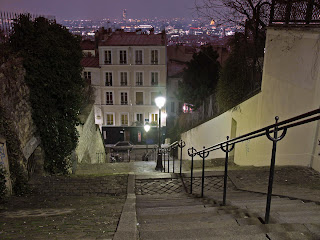(written during class, without revision, so if the argument doesn't really make sense, just trust, that in my head, at the time of composition, it did.)
What has struck me throughout this course has been how seemingly important narrative was to the dissemination of scientific thought. When I originally thought about the course, there was a very distinct difference, in my head, between serious scientific work and work primarily interested in narrative. As a product of today's culture, science presented in narrative form seems to be thought of as less scholarly, and consequently, less reliable. However, after reading Cook, Darwin, Humboldt, etc., I see that the presentation of science in narrative form as an act of honest scholarship.
In one of the first questions of the class from Geertz's piece, we asked if authorial presence in a text made the text more truthful, valuable, ethical. Today, we want objective logic, facts, results; we don't want serious work adulterated by personal pronouns. We like to think that just maybe we can step off of our ideological platforms and perform objective discourse. Most of the time however, an attempt at pure objectivity is not possible and therefore any such attempt carries with it some level of dishonesty. In the scientific travel narratives that we read for the class, the author's presence in the text was almost always visible: the reader is commonly aware that it is the author's experiences and research that they are reading. By inserting the self into the text, the authors that we read, don't get wrapped up in discussions of objectivity and instead, seemingly accept the implications of authorial presence. By avoiding fake objective discourse, the authors, through narrative, are able to present scientific research in more honest and as Geertz might say, ethical ways.
To sum up the class, and this discussion, personal narrative, in my view, does not detract from serious scientific (or scholarly) discourse, but because it doesn't pretend to be fully objective, makes the discourse more ethical, and in some ways, dare I say, more "true."
Presentation Remarks:
Hillary,
When I was a kid I read this book called "Northwest Passage" in which in American expedition team ventured into the wilderness to try and find the prized passageway. The characters in the book are full of passion, drive, curiosity and obsession, almost to the point of destruction. Almost.
Similarly, I found the "almost" in the captain of your narrative, particularly interesting. Though he seemed to have a certain drive about him, he still made the call, if I remember correctly, to turn around and head. He almost made it, but didn't. Often common sense can be trumped by drive, and yet, in this case, common sense prevailed and the captain accepted the "almost" status of his voyage; something, I imagine, that he would have thought about for a long time after.
Kellan,
While I was a bit disappointed you did not discover a travel narrative about particular swine of a certain island or continent, your presentation was nonetheless interesting. What I stuck with me was the sense that though collectors were employed on state sponsored trips, the made collections were second best to the state's intentions. It was a bit sad to hear that the voice of your narrative was stuck making agricultural and economic charts (lots of them) when he really wanted to be collecting. And further, that the collection he did manage to make was not looked at with much favor. It would be similar to going to Disneyland and having to study crowd interaction when all you really wanted to do was ride Splash Mountain.
Toria,
Dicey seemed spicy. A real character. That is what is great about a lot of these travel texts, we often get a real sense of the person behind the travel. In your case, a humorous, self-involved, romantic hero wannabe. Sorry so short, gotta run to class.




